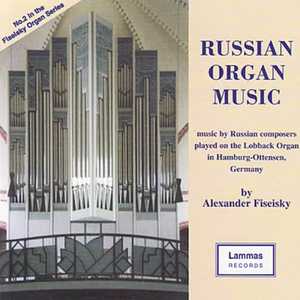Russian Organ Music

Alexander Fiseisky on the Lobback Organ in the Kreuzkirche, Hamburg-Ottensen, Germany
Fugue in E flat major
Fugue in A minor
Fugue in D major
Prayer without words Vladimir Odoyevsky
Prelude in G major Constantin Homilius
Prelude and Fugue in D major Alexander Glazunov
Canon Yevgeny Gunst
Prelude and Fugue in E flat major Alexander Goedicke
Fantasy on an English Folk Song Oleg Nirenburg
Trio sonata No. 2 Oleg Nirenburg
Two small pieces for organ Alfred Schnittke
Total playing time 67m
Russian Organ Music
Russian Organ Music
Most of the pieces selected for this recording were composed under the influence of the German organ tradition and German style of organs in Russia, above all in St Petersburg and Moscow. Three Fugues (Berlin, 1833-4) by the founder of classical Russian music, Mikhail Ivanovich Glinka, should be treated in the spirit of extempore organ improvisations. It is highly likely that they were performed by the composer himself on the house organ "Sebastianon" of his friend Vladimir Odoyevsky in the private organ recitals attended by the créme de la créme of the mid nineteenth century Moscow and St Petersburg intelligentsia.
The dynamics and registration of Vladimir Fyodorovitch Odoyevsky"s Prayer without words stem from the composer, who seems to have conceived them for his organ "Sebastianon". Prelude in G major by Constantin Fyodorovich Homilius, the organist of the German Reformed church in St Petersburg, is a brilliant concert piece for organ. The influence of the violin technique and the opera style is evident in this piece, and should not be a surprise, as the composer, being primarily a violinist, played this instrument at the Imperial Opera in St Petersburg.
Alexander Konstantinovich Glazunov's Prelude and Fugue in D major, Opus 93 (1906), is his first composition written for organ. This composer's early piece already reveals the characteristic traits of the Russian symphonic style: monumentality, epic breadth, a close proximity to folk music and poetry, and a consummate mastery of counterpoint.
The composer and music critic Yevgeny Ottovich Gunst belongs to the Moscow school which is associated with such names as Tchaikovsky, Taneyev and Scriabin. The influence of these composers is evident in his chamber music as well as in his Canon for the organ. Born in Kiev, the composer, concert pianist, and professor of the St Petersburg Conservatoire (1909-1942) Leonid Vladimirovich Nikolayev became famous as a leading representative of the Russian piano tradition that later became known as the "Nikolayev School". His pupils included Shostakovitch, Sofronitsky, Yudina and Serebryakov. His Fugue in E flat major was originally written for the piano, later Nikolayev himself wrote the organ version.
The composer, pianist and organist Alexander Fyodorovich Goedicke held the position of Head of the Organ Class at the Moscow Conservatoire from 1922 until his death in 1957. In his Prelude and Fugue in E flat major, Opus 34, No. 2, various stylistic influences are obvious, including those of Sergei Rachmaninov and Josef Rheinberger. But what makes this truly independent composition valuable is the natural connection effected between the two poles which always stood at the centre of his professional interests: Bach and the Baroque tradition on the one hand, and Romantic music and the aesthetic of the French symphonic organ on the other.
Oleg Yakovlevich Nirenburg"s Fantasy on an English Folk Song, which was written in 1985 as a middle movement of Concerto No. 1 for Organ, is based on the popular 17th century tune "There was a jolly miller". His Trio Sonata No. 2 also appeared in the year of the Bach tricentennial as a symbol of beauty, hope and great admiration, dedicated to the memory of Johann Sebastian Bach.
Alfred Garrievich Schnittke, in his Two small pieces for Organ, disconnects the organ from its traditions and tries to discover potential in other directions. "Although ever since childhood the organ was the instrument which featured in my daydreams, I had composed no organ music ..... until ..... 1980. I wrote out the Two Small Pieces quite spontaneously as two brief, so to speak unfinished, organ fantasias." (A.S.)
Alexander Fiseisky Lobkovo, Moscow. 3rd October 1997
Alexander Fiseisky
Born in Moscow, Alexander Fiseisky has become one of Russia's premier and most influential organists and has gained strong international recognition, having played in over 30 countries and giving about a hundred recitals a year. He studied piano at the Moscow State Conservatoire under Professor Vera Gornostaeva and organ under Professor Leonid Roizman. He had further guidance and masterclasses from Wolfgang Schetelich, Leo Kremer, Daniel Roth and Jean Guillou.
Alexander Fiseisky is the official organ soloist of the Moscow State Philharmonic Society and in this capacity he has played with many orchestras, instrumentalists and singers. A significant number of premieres of works that he has given have been dedicated to him - including compositions by Mikhail Kollontay, Vladimir Ryabov and Arif Mirzoyev. He has performed at many of the major festivals in the former USSR as well as in Washington, London, Prague, Berlin, Vienna, Copenhagen, Gdansk, Tokyo etc.
He regularly appears as a jury member of national and international organ competitions including Calgary International Organ Festival (Canada), St. Albans International Organ Festival (United Kingdom) and Gelsenkirchen International Organ Competition (Germany). His lectures and masterclasses at the Royal Academy of Music in London and Oundle International Organ Festival (UK), Musikhochschule Vienna (Austria), Musikhochschule Hamburg (Germany), Peabody Conservatoire in Baltimore (USA) etc. established his international reputation both as a tutor and musicologist.
Alexander Fiseisky has many recordings to his credit, including the complete organ works of J. S. Bach. He also continues to be nationally involved in organ matters in Russia, organizing a number of festivals and scientific conferences. He is strongly advocating the introduction of the best of Russian organ tradition to the West by editing an Anthology of Russian Organ Music for the publishers B=E4renreiter-Verlag (8217-8219).
Alexander Fiseisky, D.M.A.
Soloist of the Moscow State Philharmonic Society President of the V. Odoyevsky Organ Centre
ecorded and edited by Lance Andrews